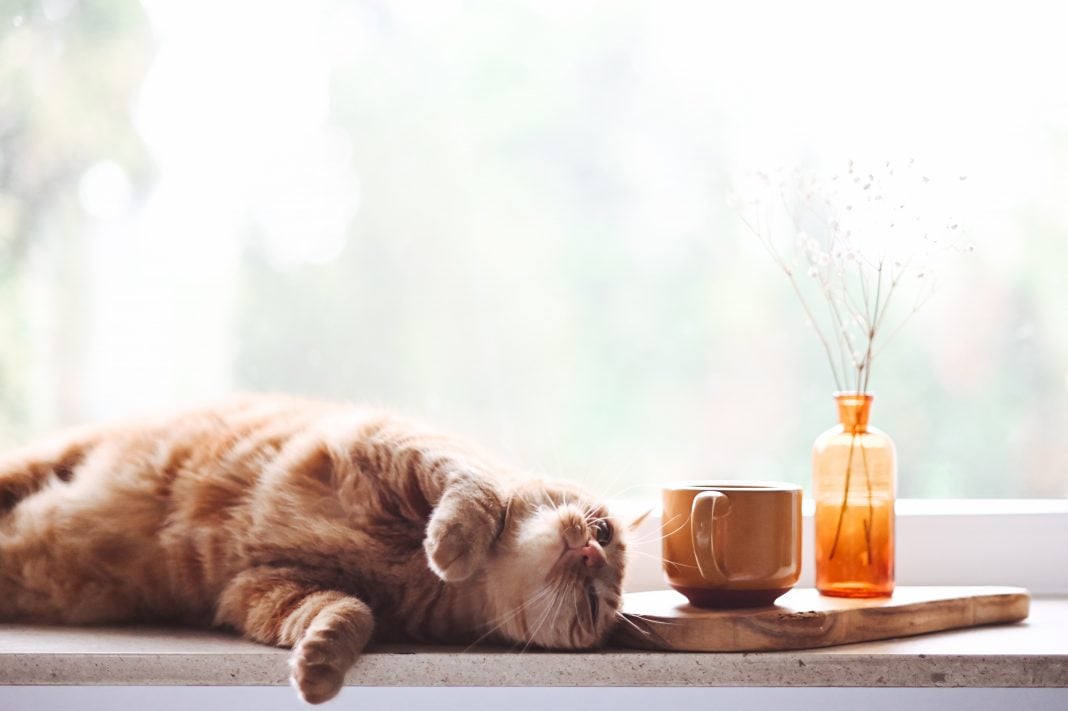Looking for the Best Organic Cat Foods? As conscious pet owners, we often seek the purest and most natural nutrition for our feline friends. Organic cat foods promise cleaner ingredients, devoid of harmful pesticides, artificial additives, and genetically modified organisms (GMOs). This article provides a comprehensive guide on the top organic cat food options in the market, ensuring your furry companion receives the best in terms of health and taste. Join us as we explore the benefits and leading choices in organic nutrition for cats.
1. Tender & True Organic Turkey & Liver Recipe Cat Food
The Tender & True Organic Turkey & Liver Recipe Cat Food is a grain-free and USDA-organic certified cat food. Its primary ingredient is cage-free organic turkey, making it a high-quality protein source. The formula is balanced for all life stages and does not contain any corn, wheat, or soy.
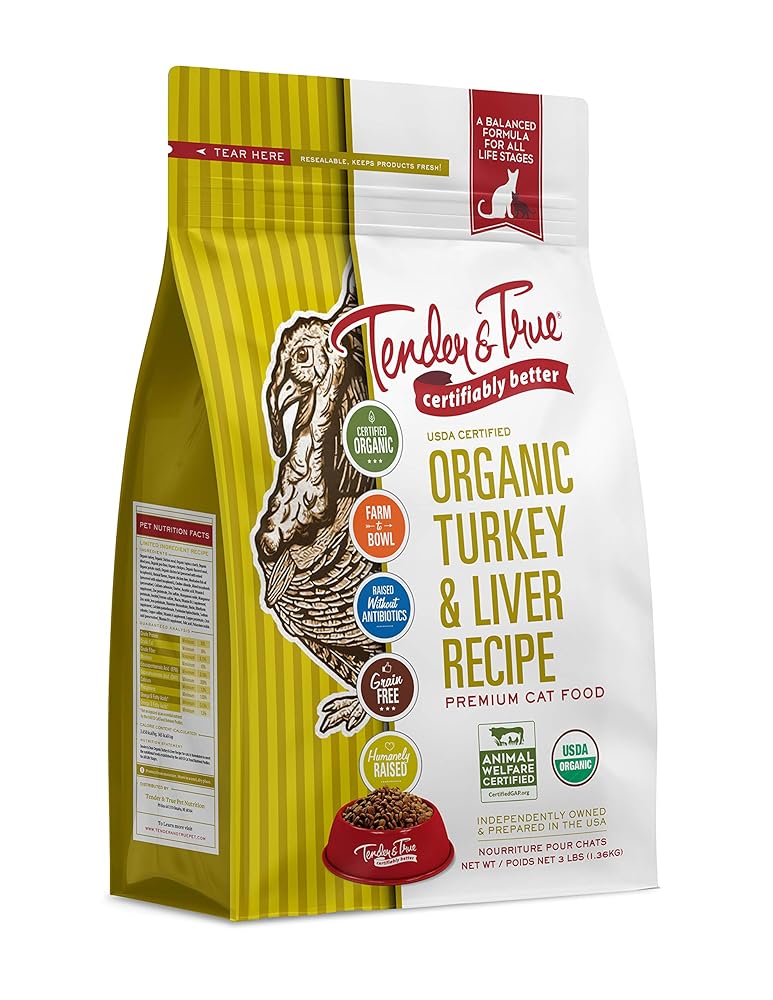
2. Tender & True Organic Chicken & Liver Recipe Cat Food
Tender & True Organic Chicken & Liver Recipe Cat Food is a USDA Organic Certified cat food made with cage-free organic chicken as its main ingredient. It is a grain-free recipe, with no corn, wheat, or soy included. The formula is designed to be balanced for all life stages of cats.
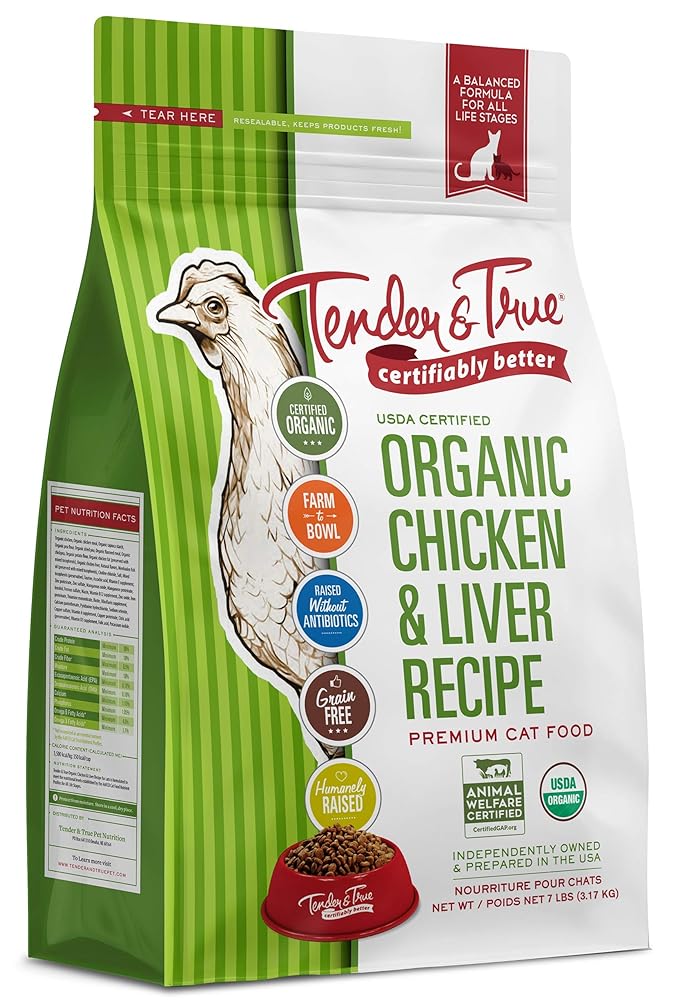
3. Castor & Pollux Organix Grain Free Organic Chicken
Castor & Pollux Organix Grain Free Organic Chicken & Chicken Liver Recipe All Life Stages Canned Cat Food is a cat food made from high-quality, certified organic ingredients. It contains omega-6 and 3 fatty acids that aid in nourishing skin and fur. Additionally, the added fiber helps control hairballs. This cat food has received certification for its organic ingredients.
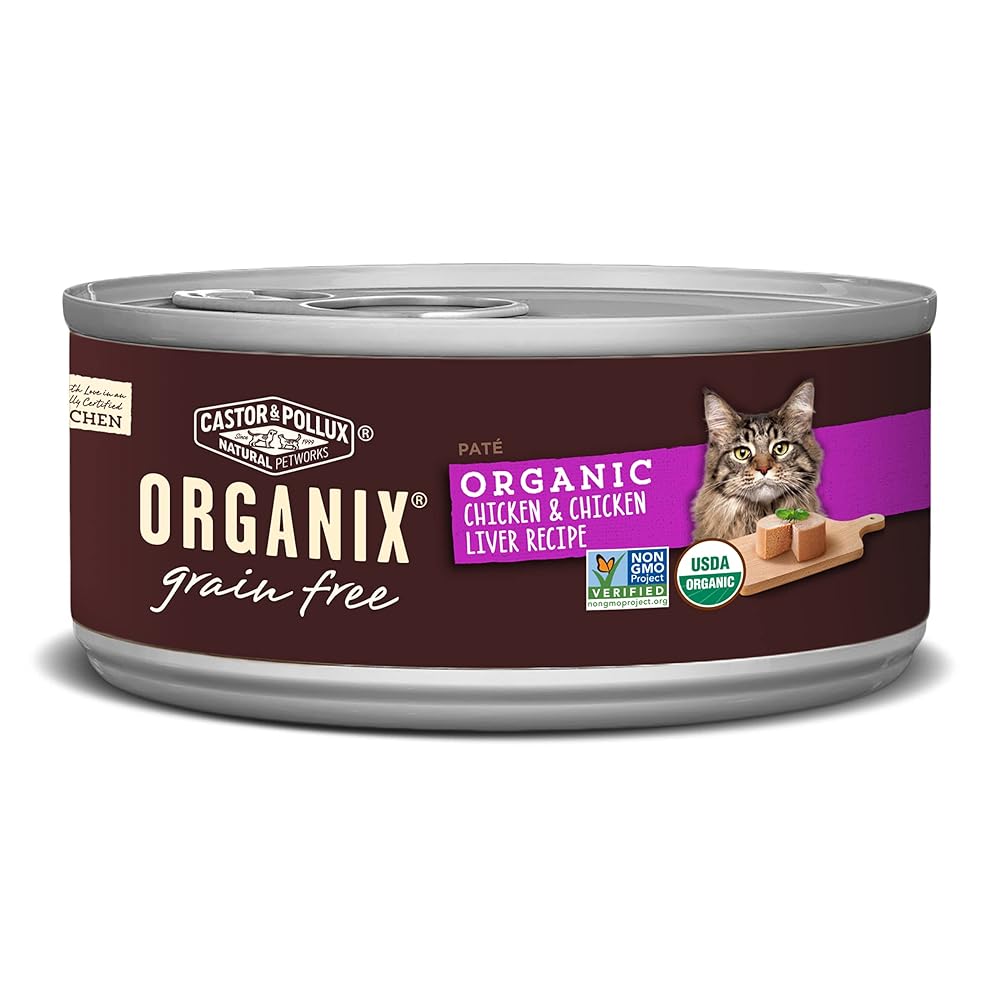
4. Purina Beyond Organic Wet Cat Food Pate
The Purina Beyond Organic Wet Cat Food Pate is a high-protein cat food made with organic free-range chicken as the main ingredient. It is made with ingredients raised without the use of antibiotics and is non-GMO Project Verified. The cat food is free from corn, wheat, soy, poultry by-product meal, and artificial colors, flavors, or preservatives. It also carries the USDA Certified Organic Seal, ensuring it does not contain prohibited synthetic pesticides or fertilizers.
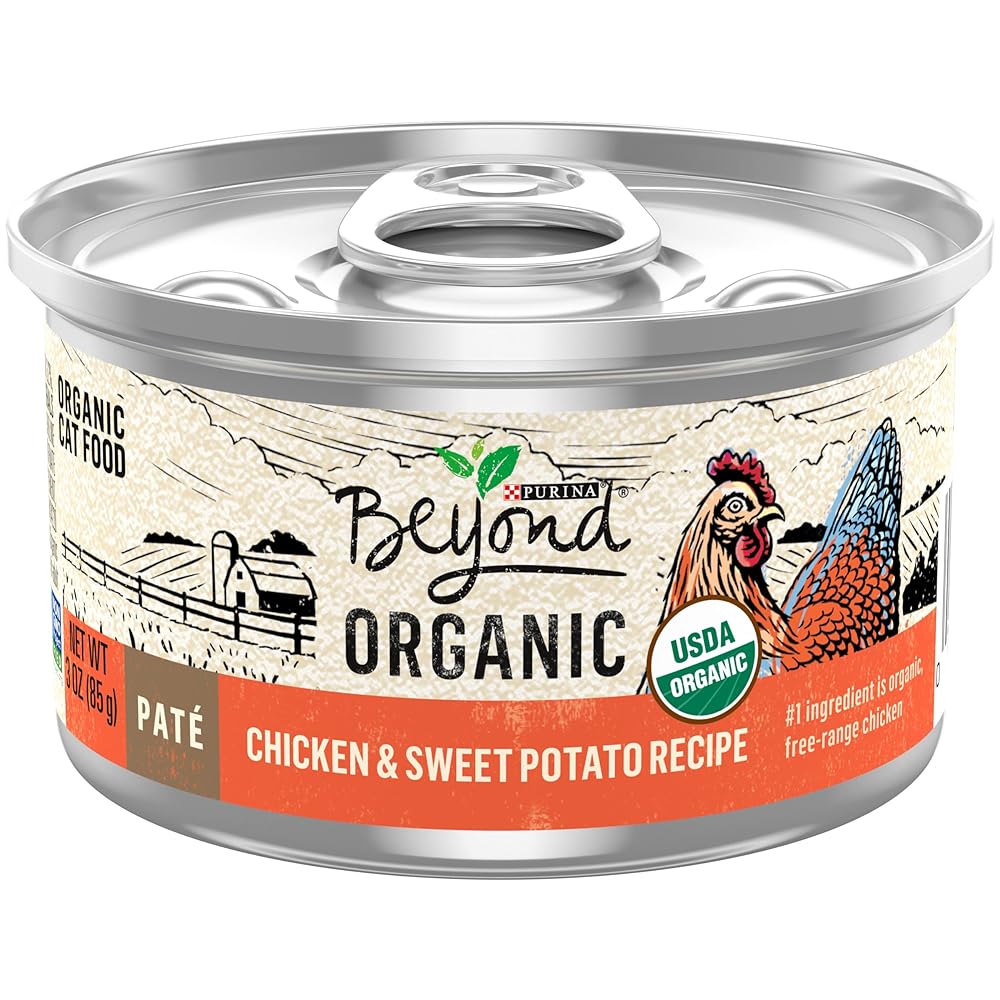
5. Evanger’s Organics Braised Chicken Dinner for Cats
Evanger’s Organics Braised Chicken Dinner for Cats is a pack of 24 cans that offers a complete dinner for cats. The product is Kosher and is formulated to be beneficial for cats with UTIs and kidney crystals, specifically struvite or triple crystal phosphate. Each can contain 152 Kcals per 100g, amounting to a total of 237 Kcals per can.
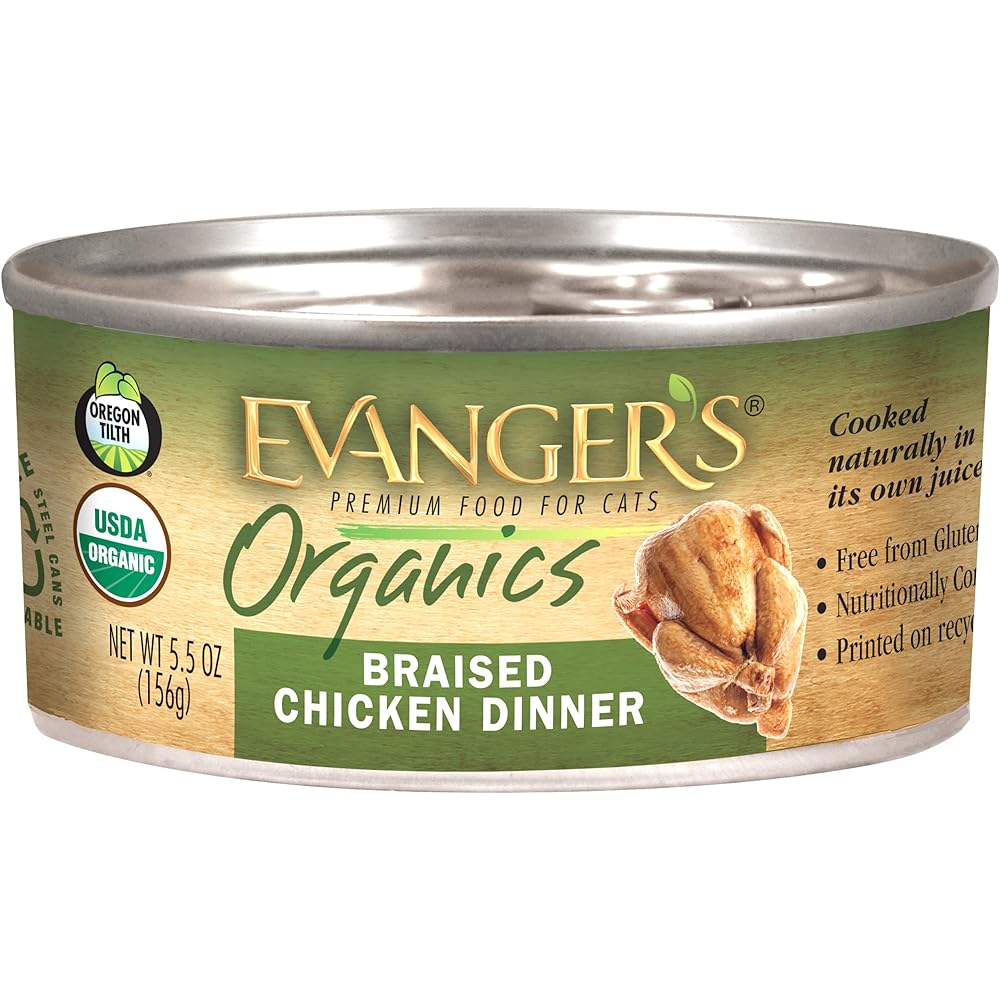
What Are The Benefits of Organic Cat Foods?
- Free from Harmful Chemicals: Organic cat foods are produced without the use of synthetic pesticides, herbicides, and fungicides, reducing the risk of your cat ingesting these potentially harmful residues.
- No Genetically Modified Organisms (GMOs): Organic standards typically prohibit the use of GMOs, ensuring that the ingredients in the food are natural and not genetically engineered.
- Higher Nutritional Content: Some studies suggest that organic foods, in general, can have higher levels of certain nutrients, including antioxidants. This might translate to more nutritional benefits for your cat.
- Ethical and Sustainable Production: Organic farming often adopts practices that are kinder to the environment, promoting soil health, reducing water waste, and decreasing pollution. By choosing organic, you’re supporting these sustainable practices.
- Free from Artificial Additives: Organic cat foods often refrain from using artificial colors, flavors, and preservatives, which can be beneficial for cats with sensitivities or allergies to these additives.
- Better Quality Protein Sources: Organic cat foods often source their proteins from animals that have been raised without antibiotics or growth hormones, which means a cleaner and potentially healthier protein source for your feline.
- Improved Gut Health: The absence of chemicals and the presence of natural ingredients can promote a healthier digestive system, leading to better nutrient absorption and fewer digestive issues.
- Enhanced Overall Well-being: Cats fed with organic foods may exhibit better energy levels, shinier coats, and fewer health issues over time, although individual results can vary.
What Should I Consider When Buying an Organic Cat Food?
- Certification: Ensure the product has a legitimate organic certification. This assures you that the ingredients meet specific organic farming and processing standards.
- Ingredient Quality: Look for high-quality protein sources listed as the first ingredient, such as organic chicken, turkey, or fish. Organic doesn’t always mean high-quality, so ensure the primary ingredients are beneficial.
- Nutritional Balance: The food should be nutritionally complete and balanced for your cat’s specific life stage (kitten, adult, senior) and needs (e.g., weight management).
- No Fillers or Unnecessary Additives: Even within organic foods, some might contain fillers or other less nutritional ingredients. Opt for products with wholesome ingredients and avoid those with excessive fillers.
- Transparency: Reputable brands will be transparent about their sourcing, manufacturing processes, and ingredient lists. They might also provide information on their ethical and sustainability practices.
- Avoid Artificial Additives: While most organic foods naturally avoid artificial colors, flavors, and preservatives, it’s always good to double-check.
- Specific Health Needs: If your cat has particular health issues like urinary tract conditions, allergies, or digestive problems, ensure the organic food you choose aligns with their dietary needs.
- Palatability: Even the most nutritious food won’t benefit your cat if they refuse to eat it. Ensure the food is tasty and acceptable to your cat, which might involve some trial and error.
- Price and Availability: Organic cat foods tend to be pricier than their non-organic counterparts. Consider your budget, but also remember that investing in quality food now might lead to fewer health issues (and vet bills) down the line.
- Reviews and Recommendations: Do some research on the brand and product. Read reviews, consult with other cat owners, and ask your veterinarian for recommendations.
Frequently Asked Questions About Organic Cat Food
- What is organic cat food?
- Organic cat food is made from ingredients that are grown or produced without synthetic pesticides, herbicides, antibiotics, growth hormones, and genetically modified organisms. They adhere to specific standards set by organic certification bodies, ensuring a cleaner and more natural product.
- How is organic cat food different from natural cat food?
- While both terms imply a healthier option, “organic” has a strict definition and certification process, ensuring the absence of synthetic chemicals and GMOs. “Natural” generally means free from artificial colors, flavors, and preservatives but doesn’t have the stringent requirements of organic.
- Is organic cat food healthier than regular cat food?
- Organic cat food can offer benefits like the absence of potentially harmful chemicals and additives. However, whether it’s organic or not, the most important factor is that the food is nutritionally balanced and meets the specific needs of your cat.
- Why is organic cat food more expensive?
- Organic farming and production methods are often more labor-intensive and yield fewer products than conventional methods. Additionally, certification and sourcing of organic ingredients can drive up costs.
- How can I verify if the cat food is genuinely organic?
- Look for official organic certification labels on the packaging. In the U.S., for instance, the USDA Organic Seal confirms that the product meets strict organic standards.
- Can my cat have an allergic reaction to organic food?
- Yes, cats can be allergic or sensitive to specific ingredients, whether organic or not. Always monitor your cat when introducing a new diet and consult a veterinarian if you notice any adverse reactions.
- Are there any grains in organic cat foods?
- Organic cat food can contain grains, but they will be grown without synthetic chemicals and GMOs. If you’re seeking grain-free options, ensure the label specifically states it, regardless of its organic status.
- Does organic mean hormone-free and antibiotic-free?
- Yes, one of the pillars of organic farming is raising livestock without the use of growth hormones or non-therapeutic antibiotics, ensuring a cleaner protein source in the cat food.
- How should I transition my cat to an organic diet?
- Transitioning should be done gradually over 7-10 days. Start by mixing a small amount of the organic food with your cat’s current food and gradually increase the organic portion while decreasing the old food until the switch is complete.
- Do organic cat foods have a shorter shelf life?
- Since organic cat foods often lack artificial preservatives, they might have a slightly shorter shelf life compared to conventional foods. Always check the expiration date and store as directed to ensure freshness.
Final Summary: The Best Organic Cat Foods
In this article, we reviewed the Best Organic Cat Foods. Embracing organic options ensures your feline companion receives nutrition free from pesticides, synthetic additives, and GMOs. Prioritizing such quality can lead to improved health, vitality, and longevity for your cat. As the demand for natural and transparent pet food sources grows, selecting the best organic food is a proactive step towards responsible pet care. Always choose products that best suit your cat’s individual needs for a wholesome diet.

